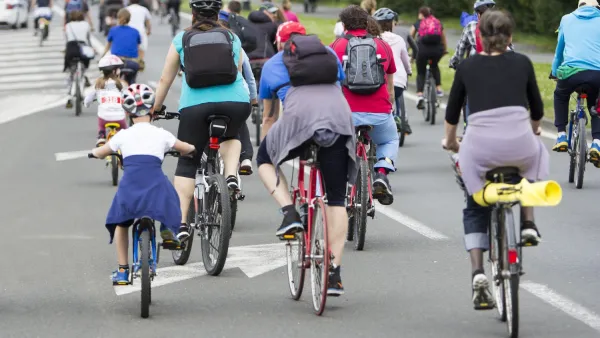Answering the question of why more women in the United States don't bike, researchers find that infrastructure and design only explains some of the gender gap. Another obstacle for women: a higher share of chores and child-supporting car trips.
A post by Herbie Huff and Kelcie Ralph (the latter, one of the researchers of the study under discussion) sets the context for the study with information that should be familiar to planners around the country: "Men are two to four times more likely to make a bicycle trip than women, and just one quarter of bicycle commuters are women nationwide. The gap is large, and no city in the US has closed it."
A recent study, titled "Honey, Can You Pick-Up Groceries on Your Way Home? Analyzing activities and travel among study and in non-traditional households," adds a new wrinkle to previous studies and advocacy efforts that argue for a lack of bike infrastructure as a reason more women don't bike. "In short, despite years of progress, American women’s lives are still disproportionately filled with driving children around, getting groceries, and doing other household chores – housework that doesn’t lend itself easily to two-wheeled transportation. It turns out that women may be more likely to bike in the Netherlands because Dutch culture is giving them more time to do so."
Some of the report's findings, and their implications:
According to the UCLA report, women with children make twice as many child– serving trips and nearly twice as many grocery trips as their male spouses. Even when women earn more, are better educated, and work more hours than their male partners, they still make 1.5 times as many child-serving trips and 1.4 times as many grocery trips. These findings reflect the fact that in most US families women still shoulder the responsibility for caring for the household, and that responsibility is hard to manage on a bike.
The article goes on to recommend three policy changes that the author's believe will be required for planners to address the "deeper societal differences" making it harder for women to hit the streets on two wheels.
FULL STORY: The reason fewer US women cycle than the Dutch is not what you think it is

Maui's Vacation Rental Debate Turns Ugly
Verbal attacks, misinformation campaigns and fistfights plague a high-stakes debate to convert thousands of vacation rentals into long-term housing.

Planetizen Federal Action Tracker
A weekly monitor of how Trump’s orders and actions are impacting planners and planning in America.

Chicago’s Ghost Rails
Just beneath the surface of the modern city lie the remnants of its expansive early 20th-century streetcar system.

Bend, Oregon Zoning Reforms Prioritize Small-Scale Housing
The city altered its zoning code to allow multi-family housing and eliminated parking mandates citywide.

Amtrak Cutting Jobs, Funding to High-Speed Rail
The agency plans to cut 10 percent of its workforce and has confirmed it will not fund new high-speed rail projects.

LA Denies Basic Services to Unhoused Residents
The city has repeatedly failed to respond to requests for trash pickup at encampment sites, and eliminated a program that provided mobile showers and toilets.
Urban Design for Planners 1: Software Tools
This six-course series explores essential urban design concepts using open source software and equips planners with the tools they need to participate fully in the urban design process.
Planning for Universal Design
Learn the tools for implementing Universal Design in planning regulations.
planning NEXT
Appalachian Highlands Housing Partners
Mpact (founded as Rail~Volution)
City of Camden Redevelopment Agency
City of Astoria
City of Portland
City of Laramie





























